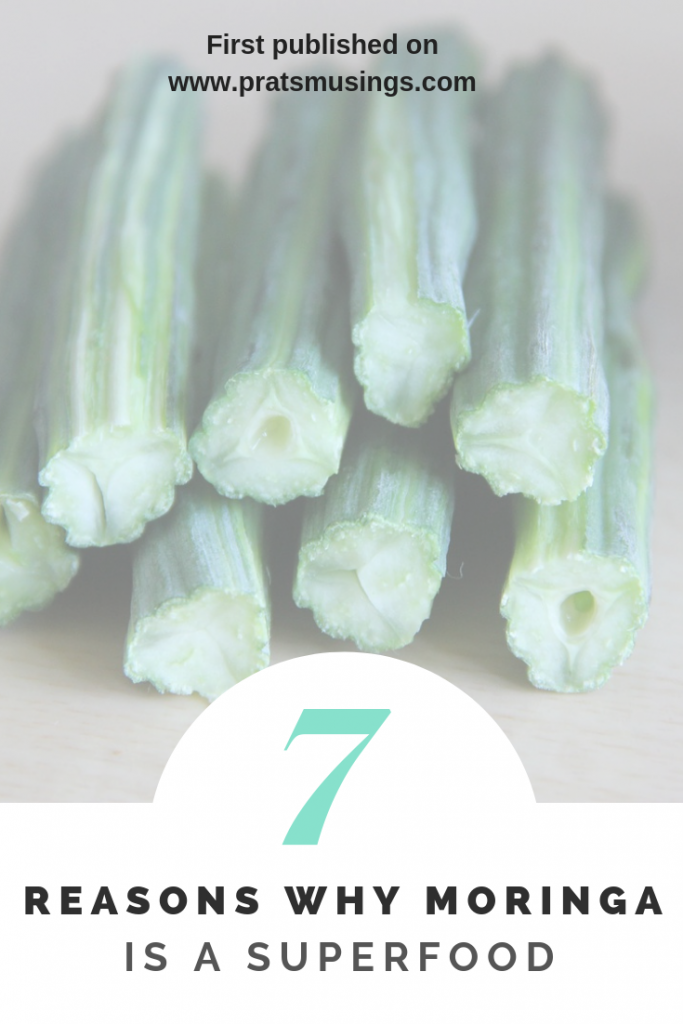It’s amazing how some foods gain sudden popularity, isn’t it? Especially when you consider the fact that they’re already being used in several cultures for centuries now! Moringa is one such food that has become a health food superstar, and with good reason too! Did you know the reasons why moringa is a super food?

Moringa is botanically known as Moringa oleifera, and it’s a plant that’s native to South Asian countries. These nations have been using Moringa for generations now, and it’s an important part of traditional medicine. What’s amazing about this plant is that all its parts can be used – the seed pods (drumsticks), mature seeds, leaves, flowers, as well as seed oil.
Moringa leaves are the most nutritional part of the plant, with an impressive nutritional profile consisting of Vitamins A, B, C, K as well as beta carotene, manganese, protein, calcium and fibre. To put this into perspective, here’s a fact: Moringa contains twice the protein in yogurt, four times the calcium in milk, four times the Vitamin A in carrots, seven times the Vitamin C in oranges, 15 times the potassium in bananas and a whopping 25 times the iron content in spinach! Now you see why it’s more than just a buzzword! Here are 7 reasons why Moringa is a super food and we’ve some recipes for you too! –it’s a true superfood!
7 Reasons why Moringa is a Super Food

With so many nutrients, Moringa is considered an ideal solution for malnutrition, especially since it is a hardy plant and can be grown easily even in arid conditions. Here is a look at how the nutrients of Moringa turns it into a super food for the entire population.
1. It Boosts Immunity
A weak immune system makes us susceptible to all kinds of illnesses, especially seasonal infections. The most important nutrients we need for immunity are Vitamin C, Vitamin A and protein – all of which are abundant in moringa. A cup of moringa pods contains 157% of the daily requirement of Vitamin C, making this a must have to boost the immune system.
2. It is packed with Antioxidants
Antioxidants are our bodies’ defence against free radicals, which are responsible for oxidative stress that causes diseases like diabetes, heart disease and cancer. Moringa is rich in antioxidants like flavonoids, polyphenols and ascorbic acid. Studies have shown that moringa is particularly beneficial for women post menopause, whose low estrogen levels cause a dip in antioxidant enzymes.

3. It Reduces Inflammation
Inflammation is a natural response of the body, but too much inflammation is responsible for chronic illnesses like diabetes, heart disease, arthritis and cancer. Moringa helps to suppress inflammation-causing enzymes in the cells. Thanks to moringa’s anti-inflammatory properties, it’s a great option for those with chronically painful conditions like arthritis.
4. It lowers Blood Sugar
Several studies show a significant improvement in diabetic patients who take moringa regularly. Moringa contains terpenoids which help the pancreas secrete more insulin. Moringa also contains an antioxidant named chlorogenic acid, which prevents sharp spikes in blood sugar after a meal.
5. It improves Heart Health
Quercetin, an antioxidant in Moringa, can help lower blood pressure, thereby improving cardiovascular health. Moringa also helps in controlling blood lipid levels and prevents the formation of plaque. In diabetic patients in particular, moringa can reduce oxidative stress, lowering cholesterol and protecting against cell damage.
3 Easy Moringa Recipes for Good Health
1. Moringa Powder

Get a bunch of fresh moringa leaves and separate the leaves from the stalks. Wash thoroughly and spread out on a clean towel. Dry the leaves in the shade. When completely dry, grind to a powder and store in a clean, dry air tight jar.
2. Moringa Tea

Put 2 tsp moringa powder and 8-10 mint leaves in a jug. Pour hot (not boiling) water into the jug. Cover and let it steep for 5 minutes. Strain and cool. Add a squeeze of lime and some honey and serve. You may also add some ginger slices in the first step.
While moringa is generally safe for use, it’s best to stick to the seed pods and the leaves. The root and its extracts can be toxic for human consumption. Due to its effects on blood sugar and blood pressure, people taking related medicines must first consult a physician before consuming moringa. Those who take blood thinners are to be particularly careful.
Moringa can make the uterus contract, due to which it is not advised for pregnant or breastfeeding women. Too much moringa can also have laxative effects, so moderation is recommended.
These are some of the reasons why Moringa is a super food This post has originally been written for QuintFit. You can read the rest of the post here.
Humare ghar per iske 4 पेड़ thy, bachapan se hi iski leaves, flower n fruit ki sabzi n saag khaya hai, mummy Daddy batate thy ki ye health k liye kitna accha hota hai
Iska powder banana sikhaya, ab main banaungi ?, thanks a lot dear
Wow amazing. Mum always said ‘eat moringa, it’s good for your health’ and here’s why.
Very informative post, we sometimes make the fruit in dal